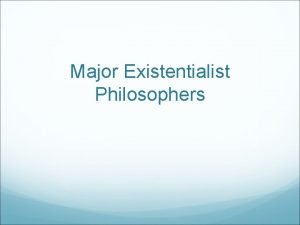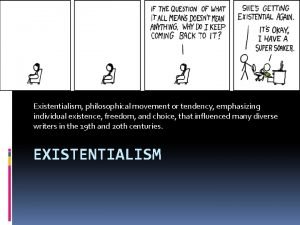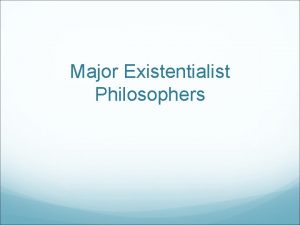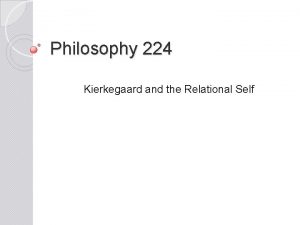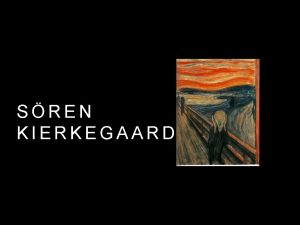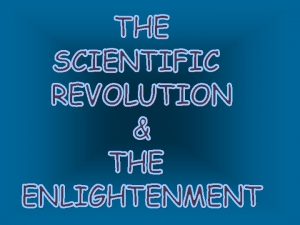Major Existentialist Philosophers Soren Kierkegaard Is known as









- Slides: 9

Major Existentialist Philosophers

Soren Kierkegaard Is known as the “Father of Existentialism” Was born in Denmark in 1813 Believed that church congregations had no purpose, that Christendom was too political, and that Christianity was becoming an empty religion Stressed importance of the individual and is credited with creating the ideas of “subjectivity” and the “leap of faith” Wrote The Concept of Irony. From the Papers of One Still Living, and Fear and Trembling, among other works Was influenced by Luther, Kant, and Socrates among others.

Friedrich Wilhelm Nietzche Was born October 15, 1844 Was influenced by Dostoyevsky, Emerson, Goethe, Kant, Plato, Pascal, Darwin and Stendahl Wrote The Birth of Tragedy, Untimely Meditations, On Truth and Lies in a Nonmoral Sense, All Too Human, and Beyond Good and Evil Is associated with nihilism, the phrase “God is dead, ” the “will to power, ” and the Ubermensch (Superman)

Nihilism Total rejection of established laws and institutions. Anarchy, terrorism, or other revolutionary activity. Total and absolute destructiveness, especially toward the world at large and including oneself. Philosophy: A. an extreme form of skepticism: the denial of all real existence or the objective basis for truth. B. nothingness or non existence.

Jean-Paul Sartre Was born on June 21, 1905 Believed that ideas are the result of real-life situations and experiences Embraced communism and opposed the Vietnam War Wrote Being and Nothingness, Existentialism is a Humanism, The Flies, No Exit, The Roads to Freedom, and Les Mots Was influenced by Kant, Nietzche, Marx, Dostoyevsky, Kierkegaard and Flaubert

Albert Camus Was born on November 7, 1913 Is often associated with Existentialism, but he personally denied this label Opposed the philosophy of nihilism Claimed that while he did not believe in God, he was not an atheist. Was a human rights activist in the 1950 s Strongly opposed capital punishment Wrote The Stranger, The Myth of Sisyphus, The Plague and The Fall Won the Nobel Prize in 1957 Examined dualisms, such as happiness and sadness, dark and light, and life and death in order to emphasize mortality Was influenced by Marx, Dostoyevsky, Kafka, Kierkegaard, Herman Melville, Nietzche, Sartre, Victor Hugo and George Orwell

Absurdism is a philosophy stating that the efforts of humanity to find meaning in the universe ultimately fail(and are hence absurd), because no such meaning exists, at least in relation to the individual. As beings search for meaning in a meaningless world, humans have three ways of resolving the dilemma: 1. Suicide or Escaping Existence 2. Religious beliefs in a transcendent world. 3. Acceptance of the Absurd.

Simone de Beauvoir Was born on January 9, 1908 Was associated with ideas of ambiguity, feminist ethics, existential feminism, the idea that “existence precedes essence, ” and that a person is not born a woman, but becomes one Believed that, in society, women have been always considered deviant and abnormal Believed that women could make the same choices as men and rise above gender roles Was active in France’s women’s liberation movement Was influenced by Descartes, Wollstonecraft, Kant, Kierkegaard, Marx, Nietzsche and Sartre Wrote She Came to Stay, The Blood of Others, All Men Are Mortal and The Ethics of Ambiguity

A Man Said to the Universe A man said to the universe: "Sir I exist!" "However, " replied the universe, "The fact has not created in me A sense of obligation. " Stephen Crane
